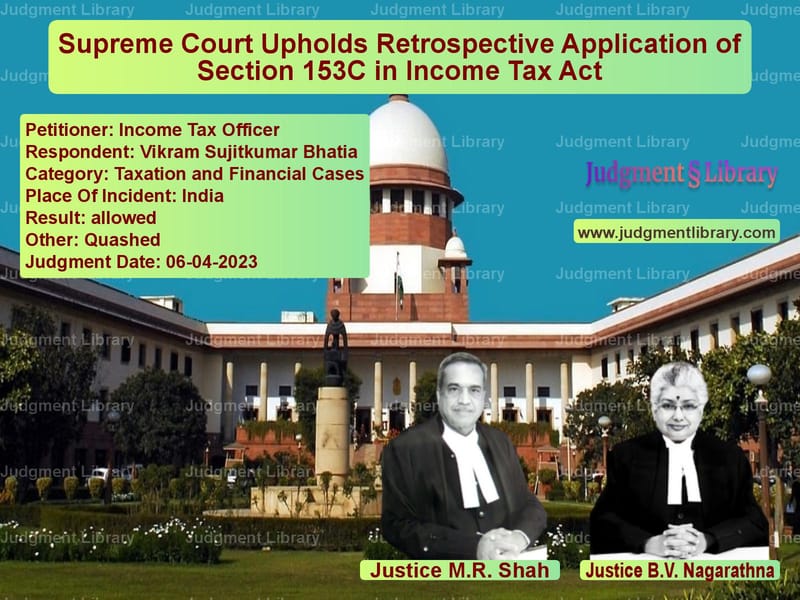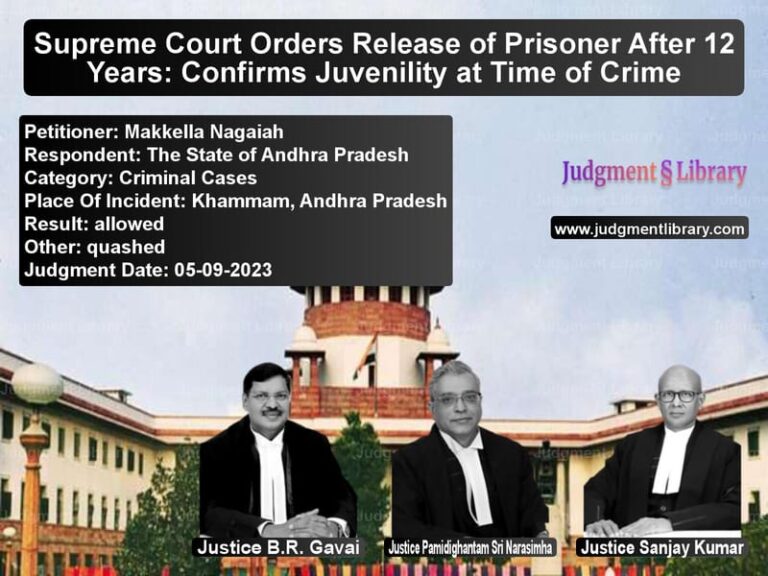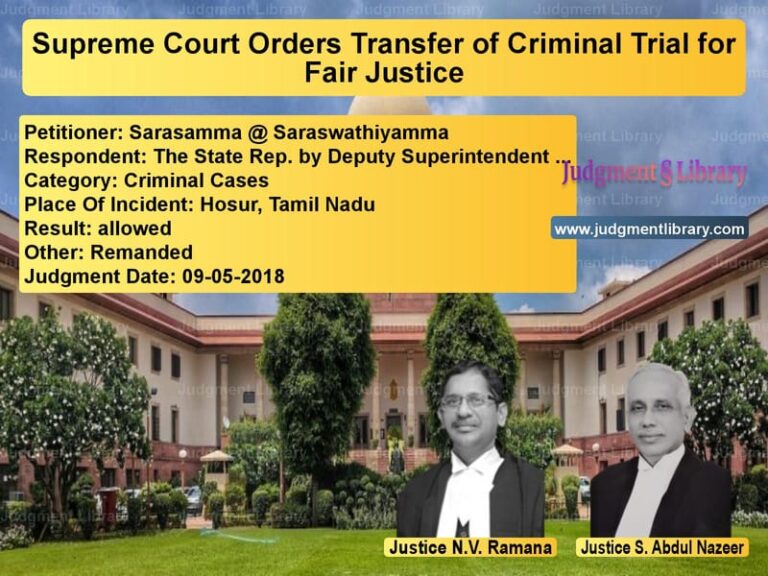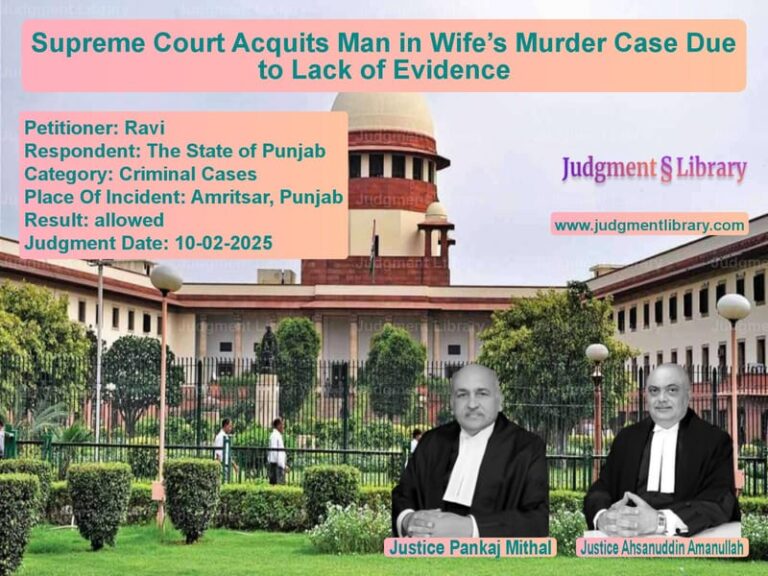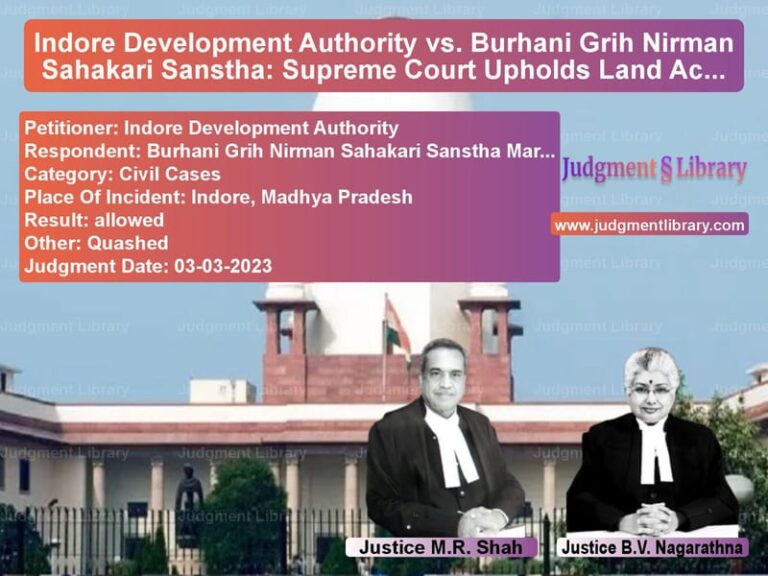Supreme Court Upholds Retrospective Application of Section 153C in Income Tax Act
The Supreme Court of India recently delivered a significant ruling in the case of Income Tax Officer v. Vikram Sujitkumar Bhatia & Others, addressing the applicability of the 2015 amendment to Section 153C of the Income Tax Act, 1961. The ruling clarifies whether the amended provision applies to searches conducted before the date of its enactment.
Background of the Case
The dispute arose when the Income Tax Department initiated proceedings under Section 153C against various assessees based on incriminating materials seized during searches conducted prior to June 1, 2015. The Gujarat High Court had earlier ruled that the amended provision, which substituted the words ‘belongs to’ with ‘pertains to’, could not be applied retrospectively. The department appealed to the Supreme Court, challenging this ruling.
Key Legal Issues
- Whether the amendment to Section 153C brought by the Finance Act, 2015 applies retrospectively to searches conducted before June 1, 2015.
- Whether the amended provision affects the substantive rights of assessees and should therefore apply only prospectively.
- Whether the amendment was introduced to rectify a judicial misinterpretation and should be applied retrospectively as a clarificatory measure.
Arguments by the Petitioner (Income Tax Department)
The Income Tax Department, represented by the Additional Solicitor General, made the following key arguments:
- Legislative Intent and Machinery Provision: The amendment was introduced to address a judicial misinterpretation in PepsiCo India Holdings Pvt. Ltd. v. ACIT, where the Delhi High Court held that documents must ‘belong’ to an assessee to attract Section 153C. The department argued that replacing ‘belongs to’ with ‘pertains to’ was a clarificatory change and did not introduce a new class of assessees.
- Substitution Implies Retrospective Application: The department contended that since the amendment was made by substitution, it must be interpreted as if the old provision never existed. The Supreme Court’s rulings in Zile Singh v. State of Haryana and Shamrao V. Parulekar v. District Magistrate were cited to support this argument.
- Purpose of the Amendment: The amendment was designed to ensure that all incriminating materials related to third parties found during searches could be used for assessment. Not applying it retrospectively would render the provision ineffective.
Arguments by the Respondents (Assessees)
The respondents argued that:
- The amendment introduces new liabilities: Before the amendment, assessees could not be assessed based on documents that merely ‘pertain to’ them. The change expands the scope of the provision and thus cannot be applied retrospectively.
- Retrospective application affects substantive rights: The High Court correctly ruled that the amendment affected substantive rights and should not apply to searches conducted before June 1, 2015.
- Legislative Practice: When the legislature intends retrospective application, it explicitly states so. Here, there was no such declaration.
Supreme Court’s Ruling
1. Amendment Applies Retrospectively
The Supreme Court ruled that the amendment must be applied to all pending cases, regardless of when the search was conducted:
“The substitution of ‘belongs to’ with ‘pertains to’ was made to rectify an anomaly. The amendment clarifies legislative intent and does not create new liabilities.”
2. Legislative Intent and Machinery Provision
The Court held that Section 153C is a machinery provision and must be interpreted to fulfill its intended purpose:
“The intention of the legislature was always to assess third parties based on incriminating material found during searches. The amendment merely clarifies this.”
3. Substitution Erases the Previous Provision
The Court relied on previous rulings and held that a substituted provision operates as if it had always been part of the statute:
“The amendment replaces the earlier language with new wording. In legal terms, it must be read as if the original provision never existed.”
4. No Violation of Assessee Rights
The Court dismissed concerns that retrospective application violated substantive rights:
“Section 153C does not impose a new tax liability but merely lays out the procedure for assessment. There is no vested right to escape assessment due to a drafting oversight.”
Key Excerpt from the Judgment
Summarizing its decision, the Supreme Court stated:
“The amendment brought to Section 153C of the Income Tax Act, 1961, by the Finance Act, 2015, shall be applicable to searches conducted before June 1, 2015. The judgment of the High Court is set aside, and all assessments made under the amended provision are upheld.”
Conclusion
The Supreme Court’s ruling has far-reaching implications for tax enforcement in India. By holding that the amendment applies retrospectively, the Court has empowered the Income Tax Department to proceed with assessments based on documents found in searches conducted before June 1, 2015. The judgment reinforces the principle that statutory amendments clarifying legislative intent can be applied to pending proceedings.
For taxpayers, the ruling underscores the importance of understanding procedural provisions in tax law. Any reliance on judicial interpretations that limit the scope of tax assessments must be carefully evaluated in light of subsequent legislative amendments.
Petitioner Name: Income Tax Officer.Respondent Name: Vikram Sujitkumar Bhatia.Judgment By: Justice M.R. Shah, Justice B.V. Nagarathna.Place Of Incident: India.Judgment Date: 06-04-2023.
Don’t miss out on the full details! Download the complete judgment in PDF format below and gain valuable insights instantly!
Download Judgment: income-tax-officer-vs-vikram-sujitkumar-bh-supreme-court-of-india-judgment-dated-06-04-2023.pdf
Directly Download Judgment: Directly download this Judgment
See all petitions in Income Tax Disputes
See all petitions in Tax Evasion Cases
See all petitions in Banking Regulations
See all petitions in Tax Refund Disputes
See all petitions in Judgment by Mukeshkumar Rasikbhai Shah
See all petitions in Judgment by B.V. Nagarathna
See all petitions in allowed
See all petitions in Quashed
See all petitions in supreme court of India judgments April 2023
See all petitions in 2023 judgments
See all posts in Taxation and Financial Cases Category
See all allowed petitions in Taxation and Financial Cases Category
See all Dismissed petitions in Taxation and Financial Cases Category
See all partially allowed petitions in Taxation and Financial Cases Category

